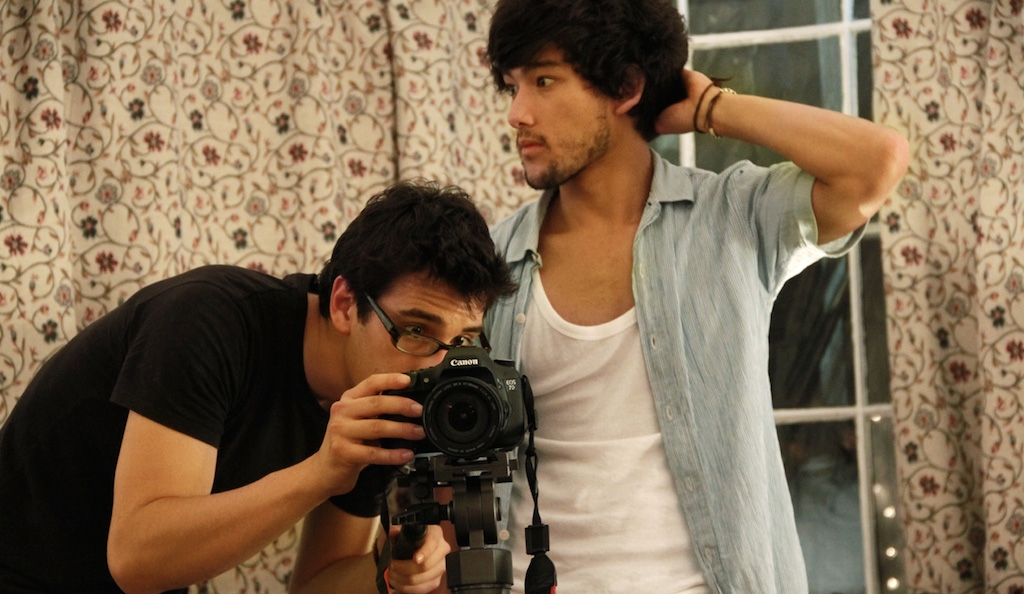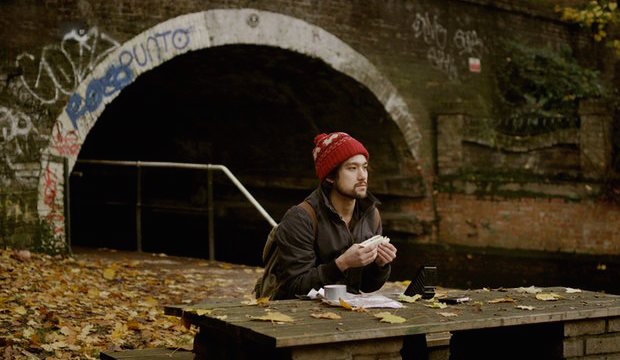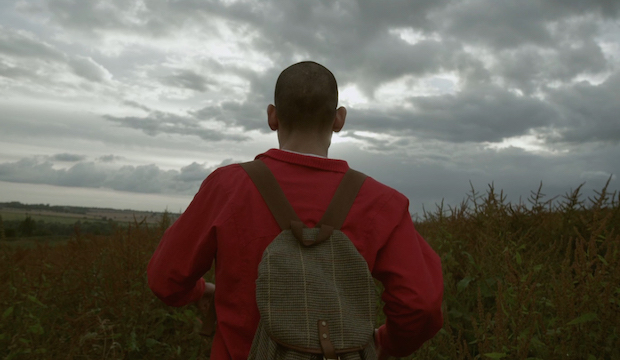Interview with filmmakers Will Sharpe and Tom Kingsley
The Darkest Universe is the bonkers follow-up to Black Pond, the BAFTA-nominated black-comedy hit of 2011. We talk to to the uber-talented prodigies who made it

It follows Zac (played by Sharpe), a neurotic city trader whose life unravels after his sister Alice goes missing on a narrow-boat trip on a canal. Frustrated with the unsuccessful attempts of the police to find Alice (Tiani Ghosh) and her boyfriend Toby (Fresh Meat's Joe Thomas), Zac starts his own amateurish search. The film intersperses his video-blog-assisted campaign with flashbacks to his isolated, fractured life, and suggestions that Alice's disappearance might have had otherworldly causes.
That's the plot, more or less, but it's hard to convey the unique mixture of comedy and mystery to someone who hasn’t seen Black Pond, also a film about a missing person case that exposes the deep loneliness of the central character. Helpfully, an old fall-back question put to Sharpe and Kingsley turns out to be a helpful primer for the uninitiated.
When asked about the best films they’ve seen this year, the duo mention Victoria, The Greasy Strangler, and Under the Shadow. Even this small sample of their cinematic tastes is revealing. Like the one-take thriller Victoria, their films are feats of directorial bravado; like The Greasy Strangler, they show a fondness for the bizarre and outré; and like Under the Shadow they are pretty darned brilliant.
Still, we thought we’d give them a go at properly describing The Darkest Universe.
Kingsley: It’s a portrait of someone suffering a mental breakdown, about how this person who’s very highly-strung and wants to control everything has to deal with something unknown, something very sad, and how that changes him.
Sharpe: For a while we tried to describe it as ‘non-sci-fi sci-fi’. It’s a human story, set – seemingly – in the real world, but there are flourishes of sci-fi imagery, and you have the option of interpreting the film in a science-fictional way. I guess that the sci-fi streak in it became less and less pronounced as production went on, in support of the relationships stories. It was distracting from the emotional arcs of the characters, so it all became subsumed as texture and undercurrent.
That is to say: The Darkest Universe is a funny drama about a familiarly brittle and repressed British 'type', but there's enough surreality to free the film from the constrictions of the kind of downbeat low-budget indies that this county usually produces. If it is sci-fi, then it's at the opposite end of the spectrum to, say, Star Wars, which it was never going to resemble: The Darkest Universe can fairly be described as micro-budget (Black Pond was reportedly made for £25,000), which is a double-edged sword for Sharpe and Kingsley.
Kingsley: It’s a tiny budget, but within that amount of money we could do anything we wanted because no one was waiting for the film. Which is good for the film – but it’s not good for your sanity. Friends say, ‘why can’t you come out for a drink?’ 'Well, I’m still making that film...'

Will Sharpe as Zac in The Darkest Universe
It has to help that some of these friends are willing to star in the film, and that circumstances mean they can afford one of best comic actors around: Chris Langham, who gave an unforgettable turn in the first season of The Thick of It, was famously convicted in 2007 of downloading child pornography. Langham always claimed that it was for research purposes (he was due to play a child molester in a TV role at the time of his arrest), but he didn't work again until he was snapped up for Black Pond. It was a controversial casting decision that Sharpe and Kingsley defended in the press, and they were rewarded with Langham's wryly hilarious performance. Langham has a smaller role in The Darkest Universe, but the influence of The Thick of It and other quick-fire British comedy is all over the film. Do Sharpe and Kingsley share the same comedy influences?
Kingsley: Yeah. Some differences in general taste, I guess, but comedy is the thing we’re pretty close on.
Sharpe: And also we’ve known each other for quite a long time now, so we’ve also watched each other’s favourite stuff. So, for instance, I grew up watching Japanese comedy, and Tom’s seen quite a lot of that now.
Kingsley: And you hadn’t seen any English films.
Sharpe: [Laughs] And I
actually couldn’t speak English until a couple of years ago.
The Darkest Universe has a superbly strange atmosphere
Sharpe and Kingsley met at Cambridge. Both members of the university's famous comedy group Footlights, they are part of a prestigious lineage of comic talent: of all the Footlights alumni, Hugh Laurie and Stephen Fry are perhaps the most famous collaborative duo. Sharpe and Kingsley's style is spikier and less populist than Fry and Laurie's, but they have the kind of creative chemistry that will last them a lifetime.
Sharpe: We can egg each other on to go to quite weird places. We get really excited and carried away, and then we’ll show it to someone, and almost exactly before we press play there’s this feeling of: this is actually really weird. And you press play anyway.
Does it ever get combative?
Sharpe: While working on Black Pond we used the analogy of ‘only rowing when the kids have gone to bed’. So when we’re on set we’re just getting it done. And there are a-hundred-and-one things to do.
But it turns out that these distractions can actually contribute to their productivity:
Sharpe: In a way, having those distractions means that when we’re having a creative discussion it’s because we absolutely have to. Whereas, when you’re given the luxury of ‘have as many creative discussions as you like’, it’s much more complicated.
As their reputations and budgets grow, things will undoubtedly get more complicated for them – as Kingsley says, they 'work in a completely different way' to other filmmakers – but it'll be fascinating to see how they adapt, and how their shared vision finds new expression. The Darkest Universe promises the brightest of futures.
The Darkest Universe
is in cinemas now

![Arrival film review [STAR:4]](/images/thumbs/cw-12177-660x375.jpg)




